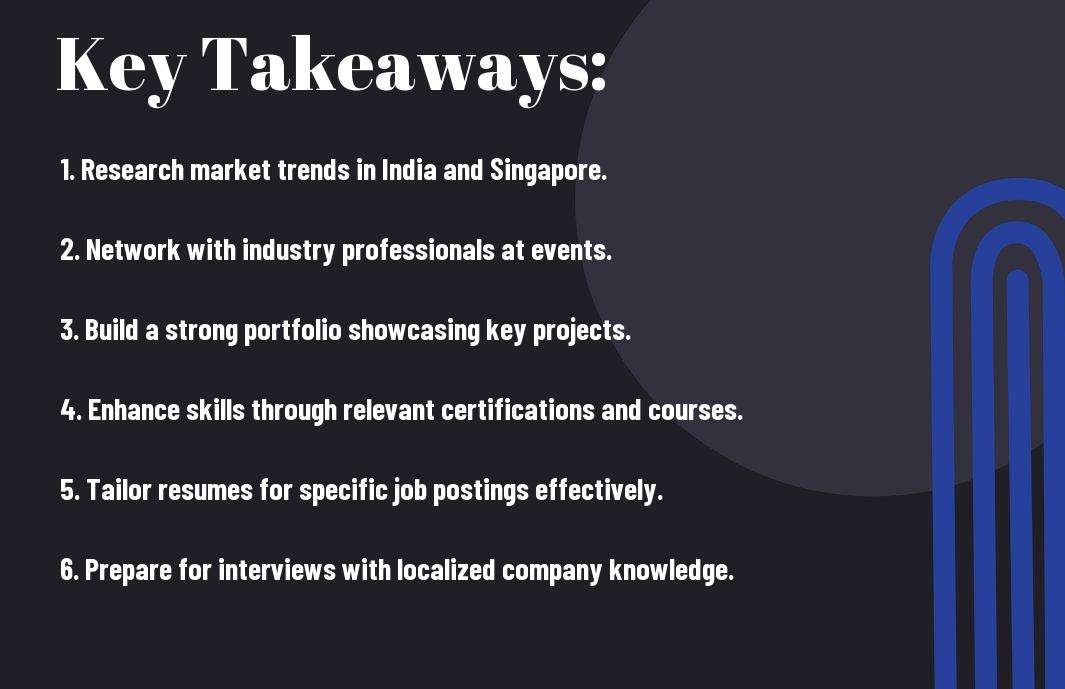With the ever-evolving landscape of tech in India and Singapore, navigating your career as a Product Owner can lead to unmatched opportunities. In this article, you’ll discover five necessary steps that can significantly impact your career trajectory, enabling you to position yourself effectively in these dynamic markets. By leveraging these insights, you can enhance your skillset, expand your professional network, and ultimately find the right opportunities that align with your aspirations. Let’s launch on this journey to transform your career prospects as a Product Owner.
Key Takeaways:
- Research the Market: Understand the demand for product owners in India and Singapore by analyzing trends and key industries.
- Network Effectively: Build connections through industry events, online platforms, and local meetups to increase job opportunities.
- Enhance Skills: Focus on continuous learning and obtaining relevant certifications to stay competitive in the evolving product management space.

Understanding the Product Owner Role
To excel as a Product Owner, you need a comprehensive grasp of the role’s responsibilities and expectations. As a pivotal link between stakeholders and development teams, you will be responsible for defining product vision, prioritizing features, and ensuring that the final product aligns with both customer needs and business goals. Your ability to balance these competing priorities will be foundational to your success in the position.
Key Responsibilities
Before stepping into a Product Owner role, you should be aware of your primary responsibilities, which include managing the product backlog, engaging with stakeholders to gather requirements, and collaborating closely with development teams to ensure timely delivery. Additionally, you will need to validate and review product increments to ensure they meet quality standards and business objectives.
Skills Required
At the heart of effective Product Ownership lies a blend of technical, analytical, and soft skills. You must be able to communicate effectively with diverse teams, translate complex customer feedback into actionable tasks, and possess a solid understanding of the market landscape.
Understanding the skills required for a Product Owner is instrumental in setting yourself apart in the job market. You need to develop strong communication and leadership skills to convey complex ideas clearly. A solid foundation in agile methodologies is crucial, as is the ability to analyze data effectively. Furthermore, your problem-solving abilities will allow you to navigate challenges and prioritize tasks effectively. Being adaptable and maintaining a customer-centric focus will greatly enhance your performance in this dynamic role.
The Job Market in India
Some of the fastest-growing job markets in India are expanding the demand for skilled Product Owners. As companies increasingly adopt agile practices, you may find a wealth of opportunities to leverage your technical skills and business acumen. If you’re transitioning from a developer role, consider exploring How to Become a Product Owner from Developer in 2024? to prepare for this career shift effectively.
Current Trends
For you to stay competitive in the job market, it’s important to keep an eye on trends such as the rise of remote work and the increased need for digital transformation across industries. Businesses are looking for Product Owners who can drive innovation and streamline processes, making it important to enhance your skill set continuously.
Key Players in the Industry
Above all, several major companies are currently shaping the landscape for Product Owners in India. The likes of Infosys, TCS, and Wipro are at the forefront, creating numerous opportunities in technology and product development, reinforcing the significance of agile methodologies.
Market analysis indicates that the demand for Product Owners will continue to grow as organizations pivot towards digital-first strategies. With the influence of global companies expanding in India, and the presence of startups innovating at a rapid pace, you stand to benefit greatly. Establishing connections within these key players can provide you with valuable insights and enhance your career prospects in this dynamic field.
Opportunities in Singapore
Many opportunities await product owners in Singapore, a thriving hub for innovation and technology. By exploring Top 8 Career Paths for Product Owner, you can identify the best avenues to enhance your career. With a strong economy and a diverse talent pool, Singapore is an attractive destination for professionals seeking growth.
Market Overview
Above all, Singapore’s market is characterized by its robust economy and a strong emphasis on technology. The demand for skilled product owners is on the rise, driven by the expansion of tech startups and established companies alike, creating a vibrant environment for you to thrive.
Potential Industries
Against this backdrop, various industries in Singapore offer immense potential for product owners. Key sectors include fintech, e-commerce, healthcare, and logistics, each providing unique challenges and opportunities for you to navigate.
Singapore has emerged as a leader in financial technology, with numerous startups focusing on innovative payment solutions and wealth management platforms. The healthcare industry is also rapidly evolving, driven by advancements in telemedicine and health tech solutions, presenting abundant opportunities. Moreover, the e-commerce sector is booming, with a growing demand for intuitive product offerings to cater to the expanding digital consumer base. Finally, logistics plays a significant role in Singapore’s economy due to its strategic location as a global trade hub, offering product owners a chance to work on impactful projects. By targeting these industries, you can leverage your skills and experience to make a lasting impact.
Steps to Enhance Your Profile
All aspiring Product Owners should focus on enhancing their profile to stand out in the competitive job markets of India and Singapore. By investing time in developing your skills, building a strong professional network, and showcasing your successes, you can significantly increase your opportunities in this dynamic field.
Education and Certifications
Above all, obtaining relevant education and certifications in product management can elevate your profile. Enroll in recognized courses, such as certifications from PMI or Scrum Alliance, to show potential employers your commitment to professional growth and adherence to industry best practices.
Networking Strategies
Against the backdrop of today’s digital landscape, building a solid network is imperative for career advancement. Engage with peers in your field through platforms like LinkedIn, attend industry meetups, and participate in online forums to exchange insights and opportunities.
Due to the competitive nature of careers in product ownership, effective networking can open doors that skills alone cannot. Attend industry conferences and seminars to connect with leaders and like-minded professionals. Utilize social media to follow industry influencers and participate in discussions around current trends. Always approach networking with a genuine intent to build relationships; this fosters a supportive community that can provide valuable insights and opportunities in the long run.
Applying for Jobs
Not all job applications yield the desired results, so it’s necessary to strategize when applying for positions as a Product Owner in India and Singapore. Leverage resources such as Product Owner Career Path to navigate this competitive landscape effectively. Tailor your application to showcase relevant skills and experiences that align with the job description, thereby increasing your chances of success.
Crafting the Perfect Resume
Perfect your resume by highlighting your experience, certifications, and skills relevant to the Product Owner role. Use clear, concise language and incorporate keywords from the job posting to ensure your resume aligns with employer expectations. Quantify your achievements to stand out and demonstrate the impact you’ve made in previous positions.
Preparing for Interviews
About 70% of your success in interviews comes down to preparation. Familiarize yourself with common interview questions specific to Product Owners, and practice articulating your answers. Research the company’s products and services as well as its culture to show your genuine interest and alignment.
Another key aspect is your ability to showcase your problem-solving skills during interviews. Prepare to discuss specific examples where you’ve overcome challenges, illustrating your leadership and decision-making abilities. Additionally, anticipate questions about working with cross-functional teams and emphasize your experience in managing stakeholder expectations. A positive attitude, coupled with confidence, will enhance your performance and leave a lasting impression on interviewers.
Navigating Job Offers and Contracts
Keep in mind that navigating job offers and contracts requires a strategic approach. Once you’ve landed an interview and received an offer, it’s crucial to thoroughly review every detail. Focus on the role’s responsibilities, salary, benefits, and terms of employment. Don’t hesitate to negotiate terms to align with your career goals and ensure the opportunity meets your expectations.
Understanding Compensation Packages
Beside the base salary, it’s important to explore into the entire compensation package that may include bonuses, stock options, health benefits, and retirement plans. Understanding these components will help you gauge the total value of the offer and determine if it meets your financial needs.
Evaluating Company Culture
Around the job offer, you should pay close attention to the company’s culture. This includes the work environment, values, communication styles, and team dynamics. Understanding whether the culture aligns with your personal values can significantly influence your job satisfaction and performance.
Even if the salary and perks seem attractive, an incompatible culture can lead to frustration, burnout, and reduced productivity. Explore employee reviews, engage with current employees on platforms like LinkedIn, and assess the company’s values to ensure they resonate with your own. Additionally, gauge the openness to feedback, opportunities for professional growth, and work-life balance during your discussions. Taking the time to evaluate these aspects ensures that you pursue an opportunity where you can thrive both personally and professionally.

Conclusion
As a reminder, navigating your career path as a product owner in India and Singapore can be streamlined by following these five insightful steps. By leveraging your skills, networking effectively, and staying updated on industry trends, you position yourself for thriving opportunities in these dynamic markets. Embrace continuous learning and adaptability, and you’ll enhance your potential for success. Your journey is unique, and with the right strategies, you can achieve significant milestones in your career.











